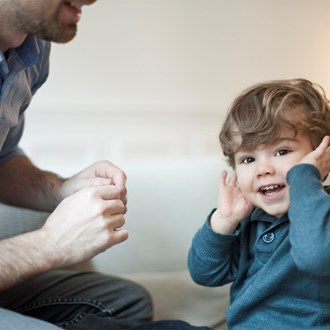Got an angry dad in the house?

Does your partner lose his temper easily? Help is here...
By Elly Taylor
Relationship counsellor / February 13 2019
Having worked with hundreds of men over the years I know different dads get angry for different reasons. Insight into what’s going on for your partner is the first step to dealing with it.
Anger is what counsellors call a “secondary emotion”. It’s often a mix of deeper, more vulnerable feelings like disappointment, anxiousness or sadness. When we can’t express these feelings (and many men have been socialised not to do so), they get buried and can start to fester. Eventually they will bubble up and sometimes explode as frustration or anger.
If this sounds like it might be true for your partner, before you broach the subject, wonder what might be going on underneath. Talk when you’re both calm and relaxed and be open to hearing - judgmentally - what he might have to say, not just his complaints – such as tiredness, work worries, financial stress, but the feelings too.
Anger affects all
Your partner may be unaware of his anger and its effect on your family – and it does affect your whole family, even babies can become fussier when they sense it. Knowing you care, despite your own worries, might be enough. Parenthood is not a competition, but a collaboration. You both have feelings and needs.
If, after you’ve broached the subject, your partner becomes more aware and modifies his attitude or behaviour, this should be the end of it. If, despite your best attempts to communicate, his behaviour continues or escalates, or you suspect he is being deliberately hostile or aggressive (putting you down) or passive aggressive (making decisions without you, withdrawing), you may need more support.
If your partner has become angrier since becoming a dad, moodiness, irritation and stony withdrawal can be early warning signs of paternal postnatal depression, which is suffered by one in 10 dads. Help is available and most couples find they end up with a richer relationship for seeking it.

Getty Images
Abusive behaviour
In some cases anger can be deliberately used in an abusive way to frighten, intimidate, control, manipulate or influence. Abuse is not always physical: it can also be psychological, verbal and emotional. Making threats, name calling, playing mind games, undermining a person’s confidence and hurtful criticism are all forms of abuse. So is attacking, discounting or minimizing someone’s experience. Abuse occurs when someone has the intention to gain power or control over someone else.
An imbalance of power creates an unstable relationship that is not likely to last the distance and children who witness any type of abuse are also victims of it, so if this speaks to you, for the sake of your whole family, get help. Your partner will need to take responsibility and learn to work with his emotions, master them and express them in appropriate ways. You may want to see a relationship counsellor to repair the damage to your relationship.
A message to dad
If you’re an angry dad, have an honest conversation with yourself and get help if you need it. You will find that when you let go of your anger, other frozen feelings that were trapped underneath finally thaw - the uncomfortable ones that can be worked through, but also the good ones like joy, passion, relief, pride, love and self-respect. Learn how to safely say, “I am angry” rather than acting it out. Learn too to say “I am sorry”, not just in words, but in loving actions that bring your family close to you again.
1800 RESPECT (1800 737 732): 24 hour, National Sexual Assault, Family & Domestic Violence Counselling Line for any Australian who has experienced, or is at risk of, family and domestic violence and/or sexual assault. Visit 1800respect.org.au
Lifeline has a national number who can help put you in contact with a crisis service in your State 13 11 14 (24 hours). Visit lifeline.org.au






